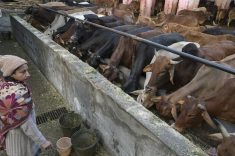After stumbling during the last years of open outcry trading at the Winnipeg Commodity Exchange, options contract trading is now staggering under the electronic form.
Traders and commercial users are worried that the WCE’s options contracts may soon die if the exchange can’t rev up trading.
“It’s dead. Dead,” said one commercial user who no longer attempts options trading through the exchange.
“It’s frustrating.”
Traders, commercial users and farm marketing advisers worry that another valuable risk management tool will be lost. The exchange acknowledges the problem and says it is trying to revive options trade.
Read Also

USDA’s August corn yield estimates are bearish
The yield estimates for wheat and soybeans were neutral to bullish, but these were largely a sideshow when compared with corn.
Options are like insurance policies. A call option contract gives the holder the right, but not the obligation, to buy a commodity at a set price until a specified date. A put option allows the holder to sell a commodity at a set price until a specified date in the future.
Farmers who don’t want to sell a crop yet but who want to ensure that prices don’t fall too far can buy put options, which allow them to lock in a basement price. Another common strategy is for farmers to sell their grain soon after harvest, but buy call options for later in the crop year so they can capture any surge in prices.
Farm marketing adviser Errol Anderson of Pro Market Communications, who specializes in option-based risk management for farmers, said he does virtually no options trading at the WCE.
“It’s a really clunky system, so 99 percent of our business is in the U.S.,” said Anderson.
Canola options trading at the exchange has steadily dropped since 2001, when more than 100,000 put and call contracts changed hands. Until 2001, options volume had generally increased, but since then it has steadily decreased.
In 2004, only 15,589 canola options contracts traded.
The advent of electronic trading last December has not reversed the trend.
“I thought the electronic side was going to resurrect the options trade, but if anything it’s made it worse,” said Anderson.
Traders and commercial users say canola options, the main option contracts on the exchange, have become so illiquid that few are willing to use them. That has made premiums on contracts soar, because there is little competition among option writers for business. To make any writer willing to consider a sale, buyers have to offer substantial option premiums. That drives buyers away from the options market, exacerbating the problem.
Ken Ball of Union Securities in Winnipeg said removing the human element from trading might have undermined the options market.
“When there was still open outcry, the traders could see who was doing business, and if someone wanted to get something done they could usually find someone to do it with,” said Ball.
But now, most remaining traders spend their time closely following the electronically listed futures prices. They feel less confident about making trades in the less busy options market, where they can’t see who or if there is anyone to do business with, Ball said.
Options trade in Winnipeg has sagged for years because of grain industry consolidation, traders say. Xcan grain, the trading arm of the former wheat pools, used to drive the options market by making substantial trades most days, providing a liquid marketplace for traders.
But when Xcan disappeared after a merger, less commercial user trading came into the options pits. A number of local speculative traders kept options trade going by being willing to buy and sell options, relying on their instincts of when prices were too high or low, or sensing that sentiment was swinging in a certain direction.
But once the open outcry pits were replaced by electronic screens, most of the locals moved away or quit the business.
WCE vice-president Will Hill said the exchange takes the options problems seriously.
“We should be doing more options volume. There’s no question about that,” said Hill.
“It’s probably our biggest potential area for growth.”
The exchange has been looking for market makers for its small contracts and is speaking to a number of options market makers it hopes will be willing to keep the options contracts liquid.
A market maker is a person or company that promises to always provide a willing buyer or seller in a contract. They offer a bid-ask spread, which means they always post a price at which they will buy a contract and always post a price at which they will sell a contract. The prices may not be as attractive as those from speculative traders or commercial users, but they at least guarantee that a buyer can get into and out of a position rapidly.
“We really do need someone that’s here doing both-sided markets in our options,” said Hill.
“We haven’t really had anyone doing that in our options markets for two or three years.”
Anderson now hedges farmers’ risks with options listed in American markets. Instead of using the WCE’s canola options contract, he uses Chicago Board of Trade soyoil options. Instead of WCE barley options, he uses CBOT corn options.
He’d like to see a viable options market in Winnipeg because he’d use it.
“Once upon a time I did nothing but canola options, made my living off them. But now I don’t do any,” said Anderson.

















